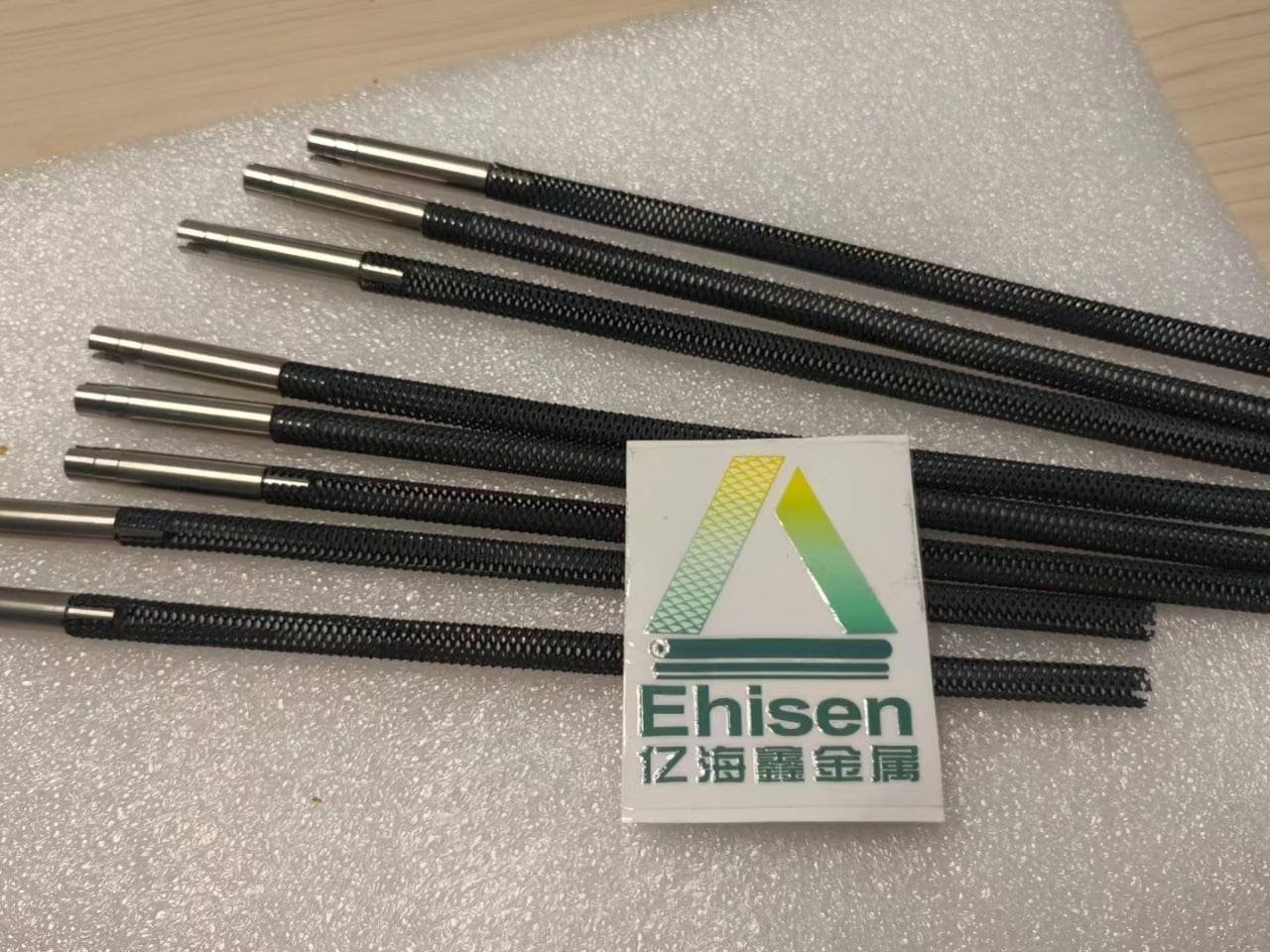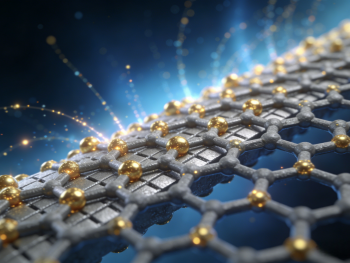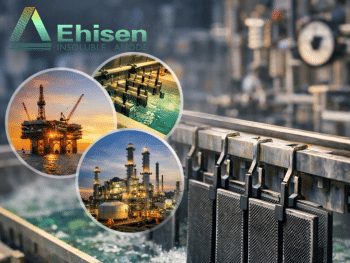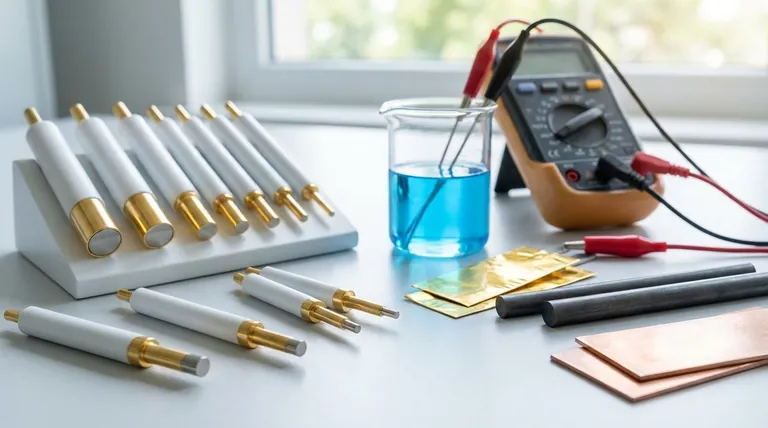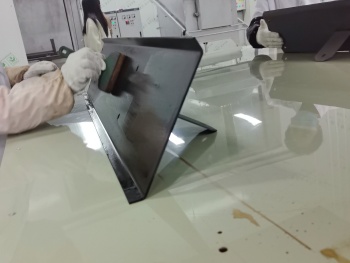Have you ever thought that the products produced by titanium anodes have touched every aspect of our lives?
Titanium anodes have emerged as a vital component in modern industrial processes due to their exceptional versatility, durability, and efficiency. From electroplating and water treatment to renewable energy systems, titanium anodes offer unparalleled performance across a variety of applications, aligning with stricter environmental regulations and industry requirements.
Titanium anodes are durable, highly efficient electrochemical tools used in diverse industries, including electroplating, water treatment, renewable energy, and manufacturing. Their corrosion resistance, long lifespan, and eco-friendliness make them the preferred choice over traditional anode materials, particularly in processes demanding high reliability and low contamination.
Understanding Titanium Anodes: Composition and Design
Titanium anodes are primarily constructed using titanium as a substrate, which is then coated with active materials such as MMO (Mixed Metal Oxide) or platinum. This combination offers:
- Corrosion Resistance: Titanium forms a passive oxide layer, enhancing durability in aggressive chemical environments.
- High Conductivity: Coatings like RuO₂/TiO₂ improve electrochemical efficiency.
- Longevity: The durable structure minimizes degradation over time.
What Are Anodes Used For? (General Explanation)
Anodes are essential components in electrochemical reactions, enabling a range of industrial and environmental processes. They serve several critical functions:
- Facilitating Electrolysis: Anodes enable the transfer of electrons, driving chemical reactions such as the decomposition of compounds or deposition of metals.
- Protecting Structures: In cathodic protection systems, sacrificial anodes prevent the corrosion of pipelines, tanks, and other metallic structures.
- Industrial Processing: Anodes are integral to processes like water treatment, electroplating, and energy production.
Traditional anode materials (e.g., graphite, lead) are being replaced by advanced options like titanium anodes due to their superior performance and sustainability.
What Are Titanium Anodes Used For Specifically? (Applications)
Below is a detailed breakdown of titanium anode applications across industries, focusing on their roles, chemical reactions, lifespan, and a comparison of their advantages and disadvantages with traditional anode materials. Each application includes subsections for clarity and relevance.
1. Electroplating Industry
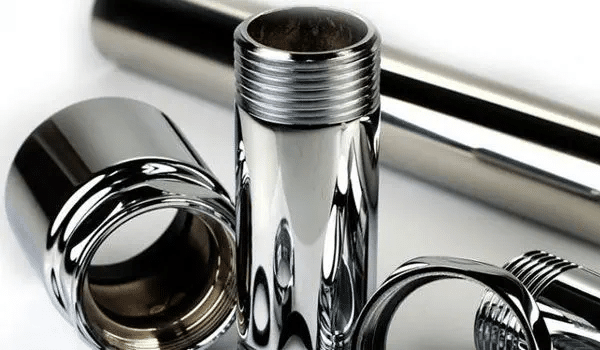
Role of Titanium Anodes
Titanium anodes are essential in trivalent and hexavalent chromium plating, nickel plating, and zinc plating. Their inert nature ensures high-quality coatings without contamination.
Key Chemical Reaction
In chromium plating, Cr⁶⁺ is reduced to metallic chromium on the cathode:
Cr2O72−+14H++6e−→2Cr+7H2O
Titanium anodes provide uniform current distribution, improving plating efficiency.
Lifespan and Maintenance
- Service Life: 10-15 years with MMO or platinum coatings.
- Maintenance: Minimal due to resistance to passivation and fouling.
Advantages and Disadvantages
| Aspect | Titanium Anodes | Lead Anodes |
|---|---|---|
| Efficiency | 95%+ (uniform plating) | 70-80% |
| Contamination | None | Releases lead ions |
| Lifespan | 10-15 years | 2-5 years |
| Power Consumption | Lower due to reduced resistivity | Higher due to resistivity |
2. PCB Manufacturing
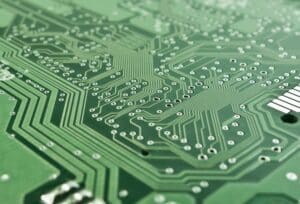
Role of Titanium Anodes
Used in etching and electroplating for PCBs, titanium anodes deliver high precision and minimal impurities in copper and gold plating.
Key Chemical Reaction
In copper plating:
Cu2++2e−→Cu
Titanium anodes ensure bath stability and uniform deposition.
Lifespan and Maintenance
- Service Life: 8-12 years in harsh environments.
- Maintenance: Low due to self-passivating titanium oxide layers.
Advantages and Disadvantages
| Aspect | Titanium Anodes | Soluble Copper Anodes |
|---|---|---|
| Plating Uniformity | High | Prone to inconsistencies |
| Environmental Impact | Minimal | High (generates sludge) |
| Lifespan | 8-12 years | 2-3 years |
3. Plate-Making Industry
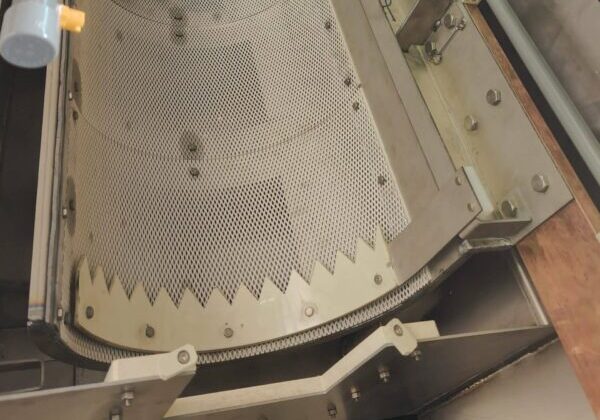
Role of Titanium Anodes
Titanium anodes serve as consumables in plate-making equipment, enabling consistent electroplating for printing and imaging processes.
Lifespan and Maintenance
- Service Life: 8-10 years with MMO coatings.
- Maintenance: Negligible, reducing operational costs.
Advantages and Disadvantages
| Aspect | Titanium Anodes | Lead Anodes |
|---|---|---|
| Durability | High | Low (subject to corrosion) |
| Cost | Higher upfront | Lower upfront |
| Replacement Cycle | Every 8-10 years | Every 2-3 years |
4. Water Treatment

Role of Titanium Anodes
Titanium anodes are used in wastewater treatment, EDI pure water systems, and hydrogen-rich water production. They oxidize pollutants without releasing secondary contaminants.
Key Chemical Reaction
Electrocatalytic oxidation generates hydroxyl radicals:
H2O→⋅OH+H++e−
These radicals degrade pollutants into harmless byproducts like CO₂ and water.
Lifespan and Maintenance
- Service Life: 15-20 years.
- Maintenance: Minimal due to resistance to fouling and scaling.
Advantages and Disadvantages
| Aspect | Titanium Anodes | Graphite Anodes |
|---|---|---|
| Pollutant Removal | 98% efficiency | 60-70% |
| Power Consumption | Low | High |
| Lifespan | 15-20 years | 1-3 years |
5. Cathodic Protection
Role of Titanium Anodes
Used to protect steel pipelines, tanks, and marine structures from corrosion by acting as inert anodes in cathodic protection systems.
Key Chemical Reaction
Sacrificial anodes transfer electrons to protect the base metal:
M→Mn++ne−
Lifespan and Maintenance
- Service Life: 20+ years for MMO-coated titanium.
- Maintenance: Low, with less frequent replacement cycles.
Advantages and Disadvantages
| Aspect | Titanium Anodes | Magnesium/Zinc Anodes |
|---|---|---|
| Durability | Extremely high | Moderate (short lifespan) |
| Environmental Impact | Safe | Generates heavy waste |
6. Hydrogen Production

Role of Titanium Anodes
In PEM electrolyzers, titanium anodes facilitate hydrogen production by splitting water efficiently in acidic environments.
Key Chemical Reaction
At the anode:
2H2O→O2+4H++4e−
At the cathode:
4H++4e−→2H2
Lifespan and Maintenance
- Service Life: 15-20 years with proper coatings.
- Maintenance: Minimal, reducing downtime.
Advantages and Disadvantages
| Aspect | Titanium Anodes | Nickel-Based Anodes |
|---|---|---|
| Efficiency | High | Lower |
| Durability | High (resistant to corrosion) | Prone to degradation |
| Cost | Higher upfront | Lower upfront |
7. Aluminum Foil Formation
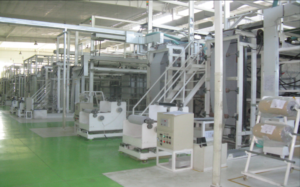
Role of Titanium Anodes
In the production of electrolytic aluminum foil, titanium anodes ensure precise etching, which is critical for creating capacitor-grade aluminum.
Lifespan and Maintenance
- Service Life: 10-15 years.
- Maintenance: Reduced due to minimal material degradation.
Advantages and Disadvantages
| Aspect | Titanium Anodes | Graphite Anodes |
|---|---|---|
| Precision | High | Moderate |
| Lifespan | 10-15 years | 1-2 years |
| Cost | Higher upfront | Lower upfront |
8. Electrolytic Copper Foil
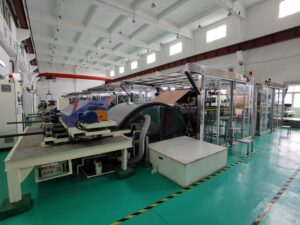
Role of Titanium Anodes
Titanium anodes enable the production of high-purity copper foils used in batteries and electronics.
Key Chemical Reaction
In copper foil production:
Cu2++2e−→Cu
Lifespan and Maintenance
- Service Life: 10-12 years.
- Maintenance: Minimal.
Advantages and Disadvantages
| Aspect | Titanium Anodes | Lead Anodes |
|---|---|---|
| Purity | 99.9%+ | Lower (due to contamination) |
| Durability | High | Low |
| Environmental Impact | Non-toxic | Toxic |
9. Chlor-Alkali Industry

Role of Titanium Anodes
In the chlor-alkali industry, titanium anodes are used in electrolysis cells for the production of chlorine, sodium hydroxide (caustic soda), and hydrogen. Titanium anodes replace mercury and lead anodes, improving process efficiency and environmental safety.
Key Chemical Reaction
At the anode:
2Cl−→Cl2+2e−
At the cathode:
2H2O+2e−→H2+2OH−
Titanium anodes resist chlorine corrosion, extending the lifespan of electrolysis cells.
Lifespan and Maintenance
- Service Life: 15-20 years for MMO-coated titanium.
- Maintenance: Minimal, as titanium’s resistance to chlorine corrosion ensures longevity.
Advantages and Disadvantages
| Aspect | Titanium Anodes | Lead Anodes |
|---|---|---|
| Corrosion Resistance | Excellent | Poor (rapid degradation) |
| Efficiency | Higher current efficiency | Lower due to resistivity |
| Environmental Impact | Minimal | High (mercury and lead contamination) |
Titanium Anodes vs. Other Materials (MMO vs. Platinized vs. Others)
| Anode Material | Lifespan | Advantages | Disadvantages |
|---|---|---|---|
| Titanium Anodes | 10-20 years | – Corrosion-resistant- High efficiency- Environmentally safe | – Higher initial cost |
| MMO-Coated Titanium | 10-15 years | – Long lifespan- Lower overpotential- Customizable coatings | – Limited to specific applications |
| Platinized Titanium | 5-10 years | – Excellent conductivity- High chemical stability | – Higher cost- Shorter lifespan in high current density |
| Lead Anodes | 2-5 years | – Low initial cost | – Toxic- Rapid corrosion- Environmental hazards |
| Graphite Anodes | 1-3 years | – Low cost- Lightweight | – Brittle- Generates sludge |
| Magnesium Anodes | 1-3 years | – Effective for cathodic protection | – Rapid consumption- Limited industrial uses |
| Zinc Anodes | 1-3 years | – Good for sacrificial protection | – Short lifespan |
This revised version incorporates all the specified industries and provides detailed descriptions, comparisons, and data for each. Let me know if there are any other refinements needed!
Does Titanium Corrode in Electrolysis? (Corrosion Resistance)
Titanium anodes are renowned for their corrosion resistance. The material naturally forms a passive oxide layer that prevents degradation, even in harsh environments such as:
- High-chlorine solutions (e.g., brine electrolysis).
- Acidic or alkaline electrolytes.
With coatings like MMO (Mixed Metal Oxide), their resistance and efficiency are further enhanced.
Why is Titanium Used as an Anode in Electrolysis of Brine? (Specific Use Case)
In brine electrolysis, titanium anodes are essential for chlorine and caustic soda production.
- Chemical Reaction:
- Anode: 2Cl−→Cl2+2e−
- Cathode: 2H2O+2e−→H2+2OH−
- Advantages:
- Corrosion resistance against chlorine gas.
- Long lifespan, reducing operational downtime.
- Example: Chlor-alkali plants have switched to titanium anodes to comply with EU environmental standards.
Advantages of Titanium Anodes Over Traditional Materials
Titanium anodes outperform traditional materials like lead, graphite, or carbon due to:
- Corrosion Resistance: Suitable for high-chlorine and acidic environments.
- Eco-Friendliness: Unlike lead-based anodes, they do not release toxic substances.
- Longevity: The combination of titanium and MMO extends service life by up to 10 years or more.
- Cost-Effectiveness: Despite higher initial costs, reduced maintenance and downtime offset the investment.
- High Efficiency: Their conductivity minimizes energy losses.
Challenges and Solutions
While titanium anodes are superior, they are not without limitations:
- High Initial Costs:
- Solution: Use MMO-coated titanium anodes to balance performance and cost.
- Unsuitability in Extreme Environments:
- Highly acidic or alkaline solutions can degrade coatings over time.
- Solution: Employ specialized coatings, such as iridium oxide, for enhanced durability.
- Specialized Applications:
- Customization is required for industries with unique electrochemical needs, increasing lead times.
Trends in Titanium Anode Development
- Advancements in Coatings: New formulations like iridium-tantalum oxide are being developed to enhance electrocatalytic activity and extend lifespan.
- Increased Adoption in Green Energy: The demand for PEM electrolyzers and hydrogen production is driving innovations in titanium anode technology.
- Integration with IoT: Smart systems are integrating sensors with anodes for real-time monitoring of performance.
Case Studies
Case Study 1: Electroplating in Automotive Manufacturing
An automotive parts manufacturer switched from lead to MMO-coated titanium anodes for chromium plating. The results included:
- 20% energy savings due to improved current efficiency.
- A reduction in hazardous waste by 90%, meeting stringent environmental standards.
Case Study 2: Wastewater Treatment in Textile Industry
A textile plant used titanium anodes for dye oxidation, achieving:
- 98% reduction in organic pollutants.
- Compliance with national effluent discharge standards.
Summary
Titanium anodes represent the future of industrial electrochemical processes. Their unmatched efficiency, long lifespan, and environmental safety make them indispensable across industries like electroplating, water treatment, and renewable energy. While the initial investment is higher, their operational benefits far outweigh the costs, positioning titanium anodes as a sustainable and efficient choice for modern industries.

